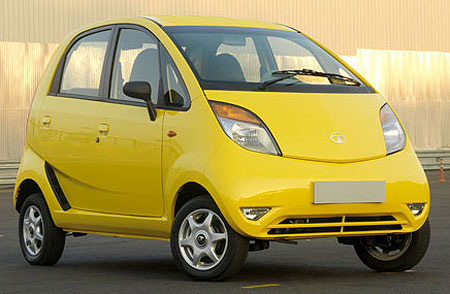 The Tata Nano is a fascinating vehicle. Launched in March 2009, it is the world’s cheapest car, retailing for $2,160 (production costs are said to be under $2,000). The car also seats four and gets 52 mpg city/61 mpg highway fuel economy courtesy of a Bosch 2-cylinder, 624 cc gasoline engine. The vehicle certainly has its downsides — lack of safety features and potential environmental impact — but it also promises radical societal change, bringing affordable transportation to the developing world.
The Tata Nano is a fascinating vehicle. Launched in March 2009, it is the world’s cheapest car, retailing for $2,160 (production costs are said to be under $2,000). The car also seats four and gets 52 mpg city/61 mpg highway fuel economy courtesy of a Bosch 2-cylinder, 624 cc gasoline engine. The vehicle certainly has its downsides — lack of safety features and potential environmental impact — but it also promises radical societal change, bringing affordable transportation to the developing world.
Now Tata’s partner, the Robert Bosch Automotive Group, is looking to improve the Tata less than a year after its introduction. Its planning an engine variant for the Tata with a single diesel cylinder.
The engine size would be in the same ballpark as the gas engine — 550-650 cc displacement. Horsepower would drop to about 25-30 hp, versus 35 hp in the current nano. However, the already impressive fuel economy would likely get a nice boost.
The new diesel will likely be the world’s smallest automotive diesel engine — smaller even than the 800 cc three cylinder in the Smart Fortwo CDi.
The new engine work was announced by Bosch’s common-rail injection Bosch Chairman Dr. Bernd Bohr. Bosch, which invested $4.3B USD globally in research and development, is now very interested in stepping up its India operations after revenue from India grew 5 percent last year. In contrast, global revenues for the recession-stricken company dropped 15 percent.


